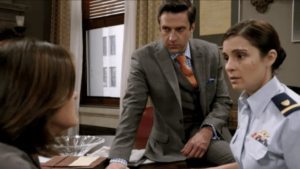Full disclosure: this post was inspired by an episode of Law & Order: Special Victims Unit that I recently watched. In episode 8 of season 15 of the show a female member of the Coast Guard admits to being raped by four of her colleagues. When Benson and her squad go to the base where she is stationed the superior calls her being in a bar and her subsequent rape “poor judgement on her part.” The victim is later arrested by army officers for “disorderly conduct.” The squad does not give up and eventually they are able to prove the identities of the four men who raped her. The victim is later honourably discharged following the trial. SVU is a show known for their storylines that are ripped from the headlines so it got me thinking and researching about real life cases where this has happened.
In the U.S. military, a female soldier is more likely to be raped by a fellow soldier than she is to be killed by enemy fire in combat. In 2012 the Pentagon carried out a report which showed that upwards of 26,000 male and female soldiers were sexually assaulted, only 3,000 of these cases were reported. The following year saw an increase in this number with 5,000 cases of sexual assault reported. The number of cases that actually went to trial is small (484) and the number of convictions were even smaller (376).
This is not a modern issue either, while the reporting of it may not have been common place there have been a number of high profile cases of sexual assault including a case in Aberdeen in 1996 as well as the US Air Force Academy scandal in 2003. Both of these high profile cases resulted in changes in the way the military deals with sexual assault accusations. In 2004 the Sexual Assault Prevention and Response Office (SAPRO) was set up with the goal of reducing and ultimately erasing sexual assault from the U.S. military.
While the problem of sexual assault in the military (or any other walk of life for that matter) may never be fully erased, the U.S. have improved they way they treat the victims. They are provided with care if they visit a Veterans Affairs (VA) facility and it has also been made easier for them to report an assault. However, despite this progress many women (and men) feel that they can’t report the attack for fear that it will ruin their career. The Oscar nominated documentary The Invisible War looked at this topic in more detail than I can, and it sheds some light on the system that makes it so difficult for people to report their attack.
-Michelle O’Brien
Junior Girl
Girl Museum Inc.

